- Home
- Susan Hill
The Comforts of Home Page 7
The Comforts of Home Read online
Page 7
‘I might have changed my mind about the police.’ He seemed to be waiting for a reaction but Simon did not make one. ‘I kept picturing myself – the life … I kept seeing myself like, you know, a piece that didn’t fit the jigsaw. The more I went into it, read about the day-to-day, the more I felt like that. Is that stupid?’
‘You know it isn’t.’
‘I’d be letting you down.’
Simon snorted. ‘You’d be letting no one down, least of all me. Grow up.’
‘I don’t want to get it wrong. It’d be a waste of everything … so I … I might change my mind.’
‘Sounds to me as if you’ve already changed it.’
‘Does it? Maybe I have then.’
‘Much better know it now, Sambo, than a year into your training. Better for you, mostly.’
‘Right …’ He was caught out by a prolonged yawn.
Simon got up. ‘Talk more tomorrow. You’re bushed. The spare bed’s made up but I’ll find more blankets – storms like this make the temperature crash.’
They went up the stairs, Sam pulling out wash kit, and the T-shirt in which he always slept, from his rucksack, while the bed was sorted, curtains drawn against the wild night.
‘Si … I just … I mean, yeah, we’ll talk about it, only …’
‘Don’t say anything to your mother.’
‘Right.’
‘As if.’ He put his arm briefly round Sam’s shoulder, unsure how much he would appreciate the bear hugs he had loved as a boy.
Sam sat on the bed to test the mattress. He tipped sideways to test the pillow, was deeply asleep within fifteen seconds and did not wake until after ten the next morning.
Downstairs, Simon poured himself a small whisky, and settled back on the sofa. He was in the middle of rereading The Spy Who Came in from the Cold, but he thought for a while about Sam. If he had been surprised at his decision, he had tried not to let it show. But he had been passionate about joining the armed police for so long, to Cat’s lasting concern, that it had seemed a done deal. Nothing else, apart from cricket and hockey – and he was an excellent player at both sports – had ever seemed to interest him. Simon had done his best to put him off, always the way to test the strength of a resolve, but Sam had never wavered.
So what came next? The police force but not the armed division? CID? There was nothing else. Sam was bright and he worked hard but he was no intellectual – an academic career would never be for him, nor would a teaching one, and life in any kind of office would surely drive him out of his skull.
They would have to find Plan B.
Nine
The Burleigh still looked the same country house hotel from the outside, but when Cat walked into the entrance hall she realised that it had had a sleek, sophisticated makeover. The walls were now a putty colour, the carpet taupe, the upholstery various shades of cream and pale grey. The front of the bar was covered in what appeared to be cream leather, the stools covered in the same but darker. The lighting had been redesigned. It was intimate but cool, the Italian influence everywhere.
Luke’s partner, Enrico, must have spent several of his many millions on the place, hoping to attract a richer and more international clientele but, location being all, she wondered if he was likely to succeed with a hotel just outside Lafferton, for all that the country was green and pleasant.
‘Cat! You look like the spring.’
She saw at once why she had fancied Luke twenty-five years ago. He looked exactly the same, in that he was still slim and more youthful-looking than was decent, his hair was still thick but had greyed a little in an attractive way. And he still had the same charm. He took her hands and kissed her on both cheeks.
‘And you haven’t forgotten how to flatter. It’s so good to see you, Luke.’
‘I have a table beside the window. Let’s have a glass of champagne to celebrate.’
He led her across the room, which was very quiet. She did not notice him indicating that he wanted to order but as they sat down a waiter appeared with two glasses of Veuve Clicquot.
‘That suit came from nowhere but Italy,’ she said. It was very pale grey, a fine wool, perfectly cut, worn with a slate-grey shirt and fuchsia silk tie. Cat tried briefly to imagine Kieron in the same outfit and smiled. He was fine in full uniform, but otherwise, the opposite of sartorial. She had been trying to update his wardrobe by small, subtle steps since they were married. Chris had been just the same. Simon, now – he could carry off a suit like that.
‘Here’s to us,’ Luke said. Olives came, and rounds of toast the size of pennies with a dab of potted shrimp and a sprig of dill, a mustard-spoon blob of caviar or a curl of smoked salmon on each.
Cat sighed and leaned back. ‘Whatever the reason,’ she said, ‘this is so good. Thank you.’
‘Right, fill me in on the last twenty-odd years, Dr Deerbon. You haven’t changed your professional name I presume?’
While they enjoyed their champagne, she filled him in, on the children, Chris’s illness and dying, Simon, Kieron. She did not mention Richard – Luke knew of her mother’s death from the medical obituaries.
‘OK, that’s the personal life. Talk about the medicine.’
‘That will take until the end of the main course.’
‘No problem. I’ve got plenty of time. You?’
‘It’s my day off.’
The hotel now had both its old formal dining room and also a brasserie. Luke gave her the choice and Cat looked over her shoulder at the main room.
‘Sorry but that would be like eating in a morgue – there’s no one in there.’
The Italian brasserie was very comfortable, it felt intimate but the tables were not set too closely together and the menu was written both on a board behind the bar and chalked on individual blackboards which came to the table. They ordered crab and lobster linguine and salad. Fresh warm bread and olive oil came first.
‘I know the state of general practice overall,’ Luke said, ‘but what about your personal experience? Bring me right up to date.’
Cat did, but set out in detail her time in palliative care at the Imogen House Hospice, the short spell as a partner again in a GP surgery, where she had felt undervalued and undermined, to her new job as a locum in the surgery.
‘It’s good in one way – they’re all nice, they’re supportive and they include me in discussions and meetings as if I were a partner. But the fact is, I’m not. I pick up the last-minuters, the overbooked patients, the temps. I do quite a lot of phone consultations. There’s no continuity, or very little, and I don’t often see the same patient twice. The usual.’
‘How many hours do you do?’
‘The equivalent of three and a half days.’
‘Facilities?’
‘Not bad. I don’t have my own consulting room, but locums never do. It works, in that I get time off to have a bit of life and see my husband.’
‘You’re not stretched.’
‘God no.’
‘Nor well paid.’
‘No … Times have changed. So have doctors.’
Cat stopped talking and ate. The linguine was moist, rich in white crab meat and chunks of lobster, the salad dressed with the best olive oil. She did not want to rush the enjoyment of it.
Luke poured them both more iced water. The jug was topped with lemon slices and fresh mint.
‘Let me tell you about Concierge Doctors.’
Bitter-lemon granitas and two lots of coffee, as good as only the Italians make it, came and went and Luke had barely stopped talking. But now he downed his second espresso and leaned back.
‘I’m not going to ask you what you think right now – there’s a lot to take in, it’s complicated, though it actually won’t be. But maybe the only reaction I need from you at this point is whether you have any objections to the principle – plenty of doctors are totally against private medicine of any kind, and I respect that. If you are, well, it’s been a great lunch and so good to see you again.’<
br />
‘Chris was totally against it. He’d have made his excuses and left before you were a quarter of the way through. I have never felt like that, though I understood some of his arguments, but with him, pride came into it and there’s no room for that, especially the way general practice is now.’
Luke waited for her to continue but she had no more to say. Not today. Not now.
‘I need a week to think this over and come up with a response. Is there anything in writing yet?’
Luke reached into his jacket pocket and took out a card. ‘All my details are here and the website details – it isn’t live of course, it’s been mocked up but by a professional designer and it tells you absolutely everything. Trying to be paper-less if not paperfree.’
‘Thanks. I promise I’ll read it very carefully and come back to you – just not until I’m pretty clear where I stand. It’s very interesting though.’
‘So you’re not saying no.’
‘I’m not saying anything at all yet, Luke, except that I’d love another coffee.’
The rest of their time was spent catching up on news of fellow medical students, and swapping stories about the parlous state of recruitment and the laxity of present-day training. Cat thought they sounded like her parents when she was in her first med-school years – nothing was ever as good as in ‘my day’.
Luke walked her out to her car and kissed her on both cheeks again. ‘I can’t wait to hear,’ he said.
‘Well, you’ll have to. Thanks for the lunch.’
He waved as she turned out of the gates. She had given him the impression of feeling moderately interested in his scheme but that going onto the website to study it in detail was not an immediate priority. In fact, she was much keener on it than she had let herself appear. She liked what she had heard so far, above all because it presented a possible route out of the professional rut in which she found herself. When she had asked Luke if she could tell Kieron about it, he had been keen that she should. ‘Partners are important in this, it affects home life, obviously. So tell him, I’d be interested to hear his views. I hope I get to meet him – never known a Chief Constable.’
Ten
It took Delphine a week to recover, not only from the injuries she had sustained in the crash from her moped but from the shock, which made her afraid of getting another bike.
‘You’d better learn to drive a car then, much safer,’ Richard said. He had put together a salade niçoise and set the table outside under the group of trees in the shade. On the other side of the garden, a hoopoe pecked about for grubs under the hedge. Delphine sat quietly, cutting a slice of bread but not eating anything yet. He poured her a glass of the dry local rosé he had taken to, a couple of bottles of which were always in the fridge, but she did not pick it up.
She sat, her nose still slightly swollen, bruised and scarred, not seeming to want to engage with him. He mixed the salad dressing and poured it.
‘What do you think,’ he said, ‘about driving lessons? You wouldn’t have to go far but it would be much better all round. If you’re worried about the cost …’
Delphine brushed the comment away with a gesture. ‘I don’t like the car.’
‘You’re happy enough to go in mine.’
‘That’s different. I mean I don’t want to drive a car. Maybe I get the Velo repaired.’
‘It’s pretty badly damaged, Delphine, they’ll probably write it off.’
‘OK, well, never mind. I’m tired of it anyway and it will be very cold in winter.’
‘Then you will have to learn to drive.’
She shrugged.
‘It won’t happen again, you know. There are so few cars coming down here and nobody else is likely to drive so dangerously.’
‘It made me very scared.’
‘Of course, but you’re much better.’
‘I do not feel it.’
‘Yes, you do, stop being childish. As soon as you go back to work you’ll forget all about it.’
‘So, how do I go back? No Velo, and even if I learn with a car, it will take some months. Besides …’ She was looking not at him but at some fixed point at the end of the garden.
‘Besides?’
‘I don’t know … maybe I don’t want to go back to work there.’
‘You should be looking for something better, Delphine. You’re a clever girl, you’re too bright to be waiting at tables.’
‘So, I go like all my school friends to college and end up with a degree and still no better job. We are all working in bars and cafes, you know. Or in the supermarché.’
Richard poured himself another glass of wine. The sun had gone down and the air in the garden was velvety, the little anti-mosquito candles glimmering, giving off their acid-lemon smell. A nightjar churred.
He looked at the girl, resting back in her chair, her hair on her shoulders. Yes, he thought. But no. After all, no.
‘So, have you any other ideas?’
She glanced at him. ‘Oh yes. I could stay here. Look after you.’
Eleven
The storm had lessened in fury by late the next morning, when Sam came blearily into the kitchen, to be fed on tea, scrambled eggs and buttered toast. ‘I don’t need to ask if you slept OK.’
‘I died, basically. Thanks for this, Si. I could probably eat it twice.’
‘Not until we get supplies you couldn’t. I need to go over to the store but maybe we can walk across to the other side then. This place is fine but I get cabin fever after twenty-four hours and it’ll be calmer by two o’clock I reckon. Might still be a bit of a blow-up on the top, that’s all.’
‘Could do with it.’ Sam spoke through a mouthful, then continued almost in the same sentence. ‘Do you think Mum’s OK?’
‘So far as I know. Why wouldn’t she be?’
‘Not sure about her work – she’s wasted doing locum stuff.’
‘Agreed. Have you talked to her about it?’
‘God no.’
‘Why not? She listens to you more than you might think.’ Sam shook his head. ‘Not my place any more. I used to think I kind of stood in for Dad a bit, you know, and then, well, just for a time after your –’ He pointed to Simon’s arm with his fork. ‘You know, for you. Sort of. Only now, she …’
‘You know …’
‘All right, all right … now she’s got a husband. There any more toast?’
The sky was sable and seal washed together, as they drove towards the quay, the wind calmer but the sea still choppy. They picked up groceries and a paper.
‘We’ll leave all this here and head out. Want a pint first?’
The bar was half full.
‘Ye’re here in one piece then?’ Iain said, pulling their beers. ‘Took a chance on your life in Sandy’s jeep.’
‘She was fine.’
‘She’s one of the best, I can tell you that. All right, Simon? The boy’s taller than you, do ye know that?’
‘Rubbish.’ Simon handed over the money. ‘Thanks for babysitting him last night.’
‘What did he mean about Sandy’s jeep?’ They had taken a table by the window. ‘She’s a great driver.’
‘Of course she is – and it’s a skill, on these island tracks in a squall. He was taking the piss. Plus a dig at women. They’re OK but a bit of that goes on.’
‘Different world.’
‘It is. If we go over the top we’ll pass her house … down a wee slope to the east there.’
‘A “wee slope”. Don’t stay here too long.’
Simon took a long draw of his pint, without reply. But he wondered. He always wondered. How long would he stay, could he stay, did he want to stay? Was he trying to duck out of a return to normal life, or whatever would pass as normal life with what Robbie called his bionic arm? He was still on sick leave and would be until he had the final prosthesis and was using it easily. Then came the decisions.
Climbing steadily, the wind at their backs, they did not talk but concentrated on the tr
ack, which was slippery and stony’ but when they got to a spur, they sat on the coarse turf and looked out over the sea. The wind blew the rush of the waves up to them, though the sky was lighter in the distance now and the swell was subsiding. Sam chewed a stalk. Simon tried to lean back on his elbows but the artificial arm did not support his weight and made him unsteady so that he was forced to roll over onto his stomach.
‘Is that where she lives?’ Sam was pointing to a slate roof just visible below.
‘No, that’s an empty croft – looks OK from here but it’s half derelict. There are one or two on the other side as well. Nobody can make any living to speak of from just a bit of land and a few sheep and chickens. There has to be something else – that’s why there are the holiday lets, but of course that’s only Easter, or a bit later, until September, and people want all the trimmings now, unless they’re walkers and birders – they’ll put up with simple conditions so long as they’ve hot water and something to brew up on. They can’t charge much for anywhere that hasn’t been tarted up. And they don’t go for tarting up much here. That’s one of the best things about the place.’
‘I’ve been thinking about medicine,’ Sam said, shifting his grass stalk from one side of his mouth to the other.
Simon waited, kept his expression neutral.
‘What do you think?’
Silence.
‘It’s not … the thing is, I mean I might. Only different from what medicine you think.’
‘I don’t think any medicine, you’ve got to tell me.’
‘Pathology.’
‘You mean in the labs?’
‘No. Forensic.’
‘Ah. Right.’
A minibus carrier was coming down the road to the side of them, and as it approached, they saw the field trippers waving madly out of the windows. Simon raised his arm.
‘So? Never mind them.’
‘OK. Why?’
‘Not sure. I like trying to find out things – deductions, you know?’
‘That’s what I do a lot of the time.’
Sam shook his head.

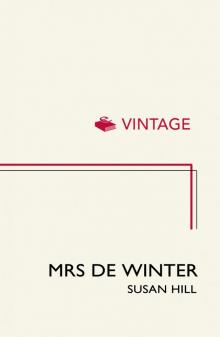 Mrs De Winter
Mrs De Winter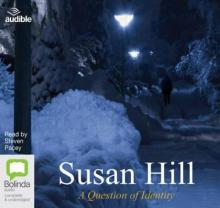 A Question of Identity
A Question of Identity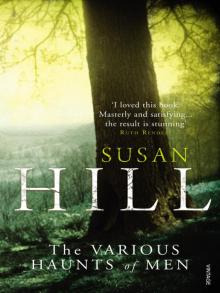 The Various Haunts of Men
The Various Haunts of Men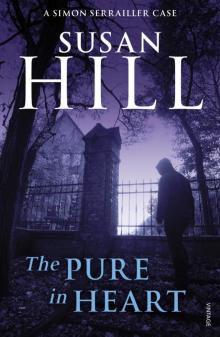 The Pure in Heart
The Pure in Heart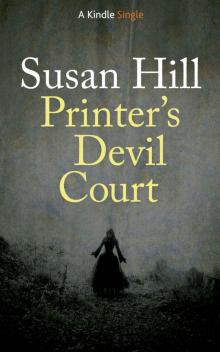 Printer's Devil Court
Printer's Devil Court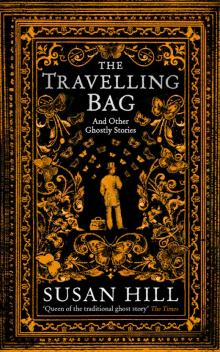 The Travelling Bag
The Travelling Bag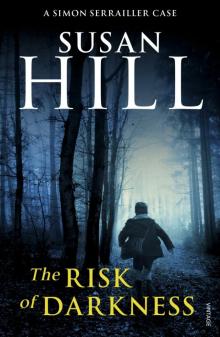 The Risk of Darkness
The Risk of Darkness A Kind Man
A Kind Man Black Sheep
Black Sheep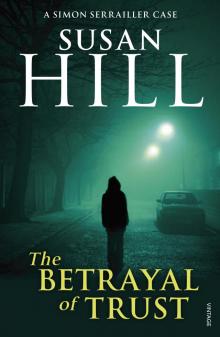 The Betrayal of Trust
The Betrayal of Trust The Service of Clouds
The Service of Clouds Betrayal of Trust
Betrayal of Trust The Small Hand
The Small Hand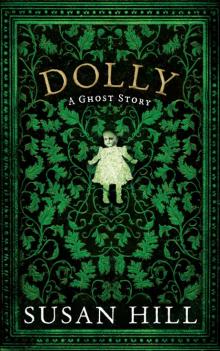 Dolly
Dolly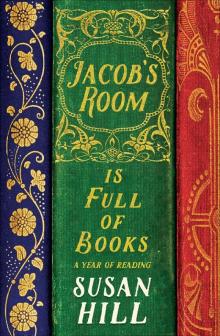 Jacob's Room Is Full of Books: A Year of Reading
Jacob's Room Is Full of Books: A Year of Reading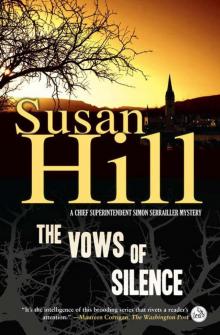 The Vows of Silence
The Vows of Silence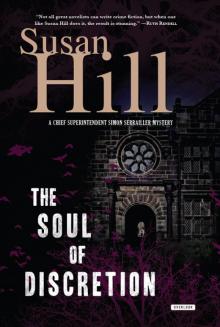 The Soul of Discretion
The Soul of Discretion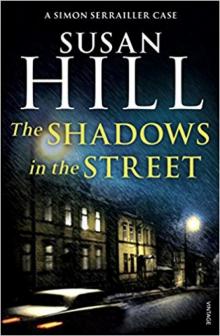 The Shadows in the Street
The Shadows in the Street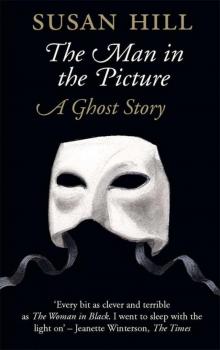 The Man in the Picture
The Man in the Picture Air and Angels
Air and Angels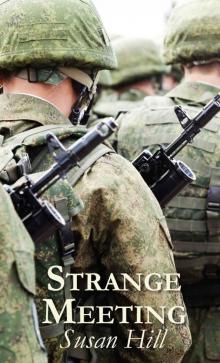 Strange Meeting
Strange Meeting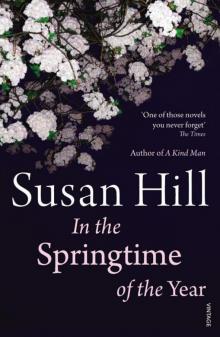 In the Springtime of the Year
In the Springtime of the Year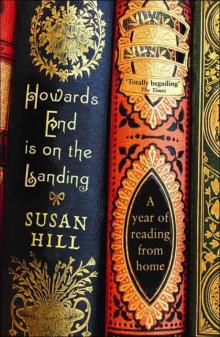 Howards End Is on the Landing: A Year of Reading From Home
Howards End Is on the Landing: A Year of Reading From Home From the Heart
From the Heart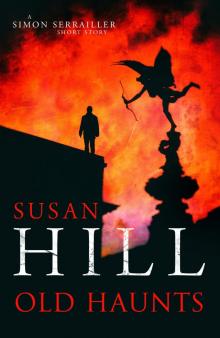 Old Haunts
Old Haunts The Mist in the Mirror
The Mist in the Mirror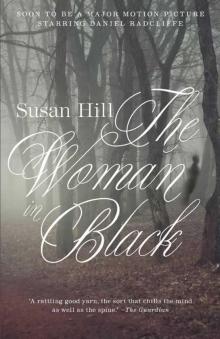 The Woman in Black: A Ghost Story
The Woman in Black: A Ghost Story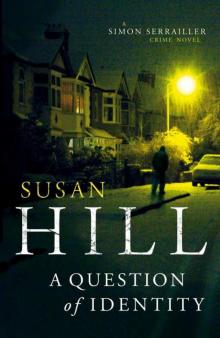 A Question of Identity (Simon Serrailler 7)
A Question of Identity (Simon Serrailler 7)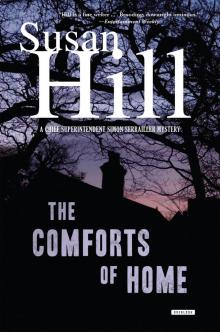 The Comforts of Home
The Comforts of Home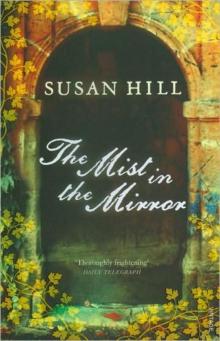 Mist in the Mirror
Mist in the Mirror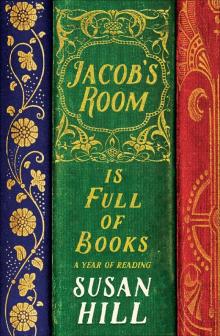 Jacob's Room is Full of Books
Jacob's Room is Full of Books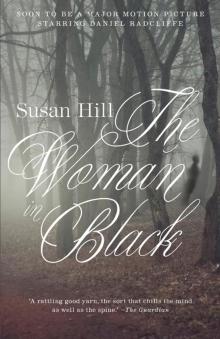 The Woman in Black
The Woman in Black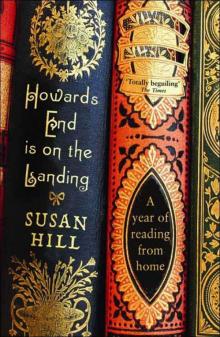 Howards End is on the Landing
Howards End is on the Landing